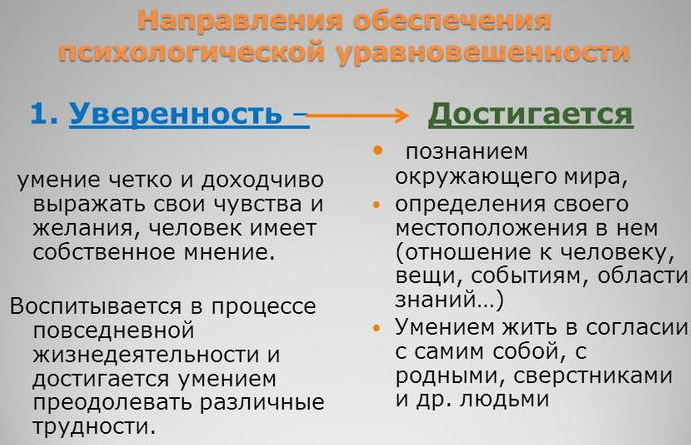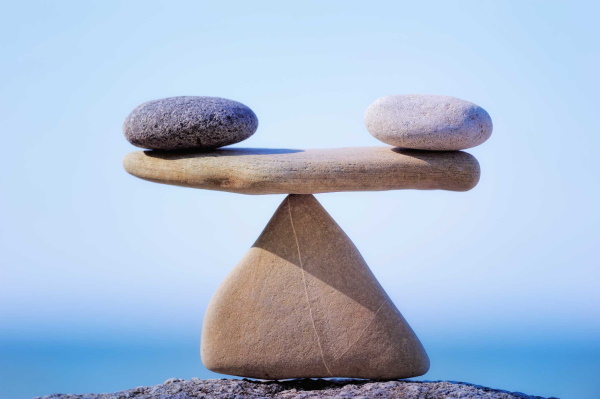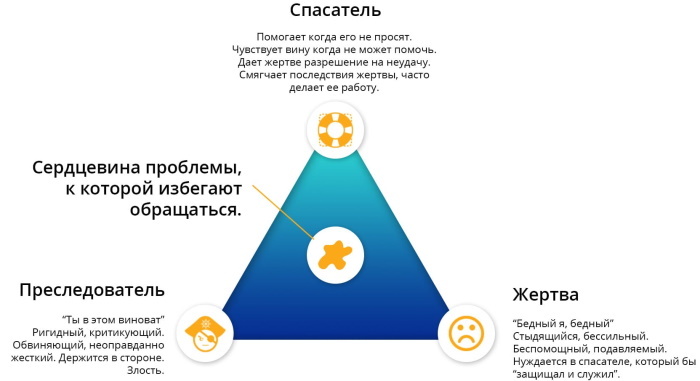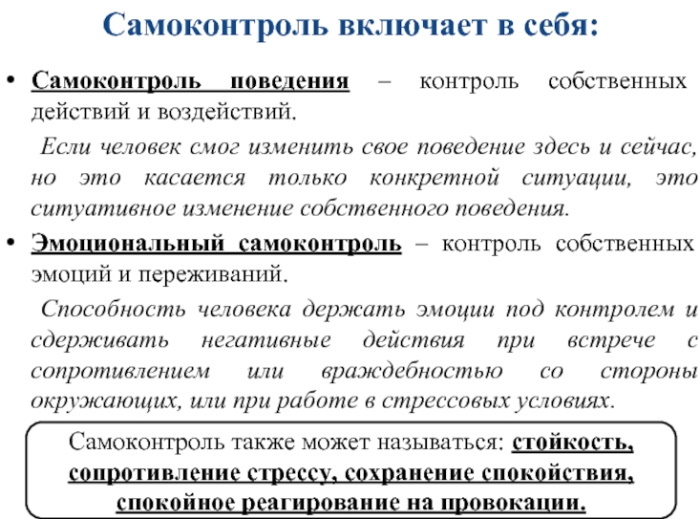Content
- The concept of poise in psychology
- Benefits of a balanced person
- Manifesting Balance in Everyday Life
- Why do people become unbalanced?
- 7 standard mistakes of unbalanced people
- Irrationality
- Victim position
- Inability to say "NO"
- Courts, gossip and confusion
- Self-deprecation
- Living in the past
- Irresponsibility
- How to achieve balance?
- Physical methods of self-control
- Psychological ways of self-control
- What medications to take
- Video about poise in psychology
Balance is that character trait that helps a person to cope with difficulties with dignity, to maintain inner harmony in almost any situation, and if necessary, to quickly restore it. Balanced people almost always respond adequately to stress and are able to find even in the most unpleasant situations, something useful or abstract from what is happening, thereby preserving the health of the nervous systems.
Psychologists believe that balanced individuals are many times happier than those who are prone to hysteria. Not everyone is naturally balanced people, but if desired, a person can work on himself and successfully develop this important adaptive quality.
The concept of poise in psychology
Balance in psychology is the ability to rationally and soberly perceive everything that happens around. Balance is closely related to the stability of the psyche and emotionality or sensitivity of the individual. Throughout life, a person experiences various and contradictory emotions - sadness and longing, joy, interest, surprise, boredom and contempt, hatred, excitement and irritation, loneliness, shame.
All these feelings are experienced by each individual in a different way. Personal emotionality largely determines how he will experience certain events and how he will react to them. In the same situation, 2 different people will give out 2 completely different reactions to happy and sad situations. To some extent, this will be influenced by the hereditary factor, and to some extent by the personal experience accumulated and acquired over the years.
Modern psychologists and physiologists identify the concept of "poise" and "dynamism" of the nervous system, which implies the ability of the nervous system to independently equalize and balance the processes of inhibition and excitement.

As a result of the research and study of the topic by the Russian psychiatrists Ushakov and Lakosina, the criteria for a balanced personality were identified:
- a conscious, mature attitude of a person to the surrounding reality, to other people;
- compliance with the actual age of the individual and his thinking, behavior;
- calm and adequate attitude to various events taking place;
- the issued reactions correspond to the strength of the stimuli affecting a person;
- mental response to some events is logically justified;
- the ability not to cross the line of socially approved behavior;
- adequate perception of significant upheavals in public life (military conflicts, protests, rallies, financial and legal crisis);
- lability (mobility) of the psyche;
- the ability to self-organize under any life circumstances;
- the ability to achieve goals without harming others.
Benefits of a balanced person
Balance in psychology is a person's self-control and restraint under any circumstances, which is manifested in the ability take control of your emotions and actions, build friendships with people around you and live in harmony with yourself and others.
A balanced person is more in control of his life than someone who has difficulty controlling his emotions, therefore has a higher chance of being happy and build multi-vector and harmonious relationships, both with the close environment and with business partners and simply with other people with whom life brings him circumstances.
The thesis of the benefits of a balanced person can be formulated as follows:
- such an individual has more chances to make the most optimal and correct decisions, since he knows how to rationally and impartially weigh the pros and cons;
- a balanced, emotionally stable person is not inclined to think in terms of extremes, according to the principle of "all or nothing";
- his own poise gives his soul and mind peace;
- a balanced personality is not characterized by the presence of a number of complexes; such people, unlike explosive and hysterical individuals, rarely suffer from self-doubt;
- the ability to think deeply rationally is another advantage of a balanced person who knows how to highlight the main and the secondary;
- external negative circumstances and people's judgments cannot unsettle a truly balanced person in themselves, or at least do it for a long time.
Manifesting Balance in Everyday Life
In everyday life, balance is manifested in various areas, helping a person not only to look worthy in the eyes of others, but also to make important, sometimes fateful decisions.
| Business sphere, working relationship | Preferring to behave diplomatically, balanced people know how to deftly balance in any situation and benefit for themselves without losing face. |
| Family life | Balance helps to better understand your partner and avoid many family quarrels. Men are more inherent in showing this quality, but sometimes it also happens that a woman in a couple is more restrained than her partner. It is also important that both parents are balanced enough when communicating with their children, since by doing so, they set an example for them how to behave and program their future behavior in adult life. |
| Companionship and everyday interaction with strangers in society | A balanced person will not argue with foam at the mouth to prove his position, sacrificing years of friendship, just in order to be recognized as right. When communicating with strangers, he seeks to avoid open conflicts and if, due to life circumstances, he has to to join them, then he behaves in such a way as to minimize negative consequences, both for himself and for the opposing side. |
| Health, wellness | Unbalanced people are often characterized by excessive suspiciousness and hypochondria, and they hardly feeling bad, they often fall into despondency and put themselves the most different, sometimes terrible diagnoses. A balanced person is not inclined to panic at the slightest ailment and is always able to help in a difficult situation not only himself, but also those around him, if required. |
Why do people become unbalanced?
Balance in psychology is the ability of the human nervous system to react not reactively (adequately) to various, sometimes not the most pleasant, events and incidents. Not all people are naturally balanced, which is associated not only with genetically inherited characteristics of responding to stress from parents, but also with temperament.
The study of the characteristics of the types of temperaments of people was a turning point in the clarification of activities higher nervous system and made it possible to link the degree of balance with the processes of inhibition and excitement.
| Weak type of nervous system. (melancholic) |
Both the processes of excitation and the processes of inhibition are poorly expressed, and therefore the individual is poorly adapts to the surrounding reality and has an increased predisposition to all sorts of neurotic disorders. |
| Strong unbalanced (choleric) | It is characterized by an explosive reaction to the events occurring with it, against the background of which the inhibition processes are greatly delayed. |
| Strong balanced inert (phlegmatic) | Such people are quite balanced, but at the same time they poorly switch from one type of activity to another, which is associated with a low mobility of their psyche. |
| Strong, balanced, agile (sanguine) | In this type of temperament, the psyche is the most mobile and the processes of inhibition and excitation are expressed equally strongly, due to which high adaptability to life realities is ensured. |
The most pronounced imbalance in melancholic and choleric people, however, it can manifest itself in different ways. If the choleric person immediately throws out all the negativity and clearly identifies what upset him so much, then a melancholic can take offense at someone or something (fate, people) for a long time and constantly live with it tension inside.
7 standard mistakes of unbalanced people
Balance in psychology is the ability to think soberly and rationally in any life situation, keep a cool mind and respond to external stimuli clearly and harmoniously, not allowing emotions to prevail over mind. An unbalanced person in himself is often deprived of all these qualities and therefore makes a lot of mistakes, building his own life and contacting other people.
Irrationality
Irrationality is closely related to feelings such as empathy, which in itself is good. quality and characterizes the individual on the positive side, as a person who knows how to empathize and compassion others. However, if he himself is unbalanced, then at some point he may get carried away with his empathy and sympathy. so much that he literally loses interest in his own life and completely immerses himself in the problems and concerns of others, forgetting about own.
The opposite of this phenomenon is rationalism or rationality, which is inherent in balanced people. They also have empathy and are always ready to help other people if necessary, but at the same time they know how to do what is called “not sinking” deeply into other people's problems, not letting them pass through themselves.
In addition, it is common for an unbalanced person to believe any unverified information without subjecting it to critical comprehension and verification, while people with a more stable psyche tend to analyze and question what is coming to them information. It is for this reason that unbalanced people often become victims of various fraudsters and deceivers who brazenly take advantage of their kindness and credulity.
Victim position
Unbalanced people, more than reserved, tend to accept the position of the victim. At first, they can do this unconsciously, but later they begin to understand how easy it is to manipulate others with the help of such a position and actively use it.
It is typical for them to be infantile to blame anyone and anything for all their troubles, but not themselves, to openly demonstrate their emotions, attracting attention to themselves and causing pity. As a result, this does not lead to anything good, since the environment begins to annoy the eternal whining and the person is simply ignored even by the closest people.
Inability to say "NO"
Often, unbalanced people themselves become victims of manipulators, since they do not know how to say "NO" at all, where they should. Sometimes unscrupulous colleagues or friends may deliberately present themselves in a miserable position for any reason and ask for help from an unbalanced person, knowing that he will definitely be imbued with their problems and will not be able to refuse.
The inability to refuse leads people with an unstable, unbalanced psyche, sometimes to more serious consequences. So, they often acquire addictions, easily agreeing to smoke or drink or even use drugs in order to relax themselves and support the company. The habit of relieving stress in this way develops very quickly in them, and poisonous chemical components that have a detrimental effect on the psyche, shatter it even more.
Courts, gossip and confusion
Being weak by nature, unbalanced individuals often try to increase their importance in the eyes of others and themselves, denigrating others. In collectives and friendly companies, they are very quickly involved in all sorts of gossip and gossip, and this applies to both women and men.
Building, in their opinion, cunning combinations, they can easily reveal someone's secret or secret, or come up with something about a person that did not actually exist. With this behavior, they themselves dig a hole, as self-confident people begin to avoid them, realizing that they are unreliable friends and partners and are highly susceptible to their impulses and impulses.
Self-deprecation
Self-doubt is a quality that in most cases is inherent in unbalanced people. Because of him, they are often pessimistic both in relation to themselves and in relation to the world around them and people. It may seem to them that their goal is unattainable, they are worthless in this life, and only on their heads all the misfortunes of the world fall.
Considering themselves second-class people, they often fall into depression and can hardly find a common language with the outside world. In order for this not to happen, such people should distinguish facts from their own conjectures and not be overly critical of themselves.
Living in the past
It is typical for unbalanced individuals to over-idealize their past, which, as it seems to them, was better and more beautiful. This is due to the fact that people in general tend to idealize the past, and unbalanced individuals still mostly due to the fact that they often do not find anything good in the present and look with longing and anxiety in future.
The present seems to them too cruel and inhuman, because there is no place in it for nostalgic memories and sentiments that so warm their souls. However, it is precisely these memories, which pop up almost daily in the head of an unbalanced person, and prevent him from living with dignity and happiness here and now.
Irresponsibility
Unbalanced people are often infantile and not self-sufficient, afraid to make decisions and take responsibility for their own lives. While the self-sufficient individual puts on himself, the unbalanced person blames everyone in the world for his failures, excluding himself. If something happens, everyone around them becomes guilty for these people - the wife or husband, the bosses, the government, but not themselves.
However, in order to achieve their goals, they should start just with themselves, come to inner and outer harmony. and stop blaming everyone around you, considering yourself a victim of insurmountable circumstances and the actions of unreasonable people around them.
How to achieve balance?
Balance is a character trait or personality trait that allows her to be most beneficial, first of all, for her to live all sorts of unpleasant, stressful situations, without falling into panic, hysteria, despondency. Despite the fact that balance is inherent in far from all people on Earth, if desired, almost any person (if he is mentally healthy) can develop this quality in himself.
Psychologists believe that unbalanced people can and should fight their heightened emotionality and strive to become more balanced and self-possessed, as this will save you from so many problems in life and teach you to adequately perceive what is happening developments.
Physical methods of self-control
Sports discipline a person, train his willpower, temper his character, making him more stable and balanced. It is good if a child has been instilled in a love of sports since childhood and is accustomed to physical activity and, growing up, feels the need to exercise - run, swim, go to the gym, ride bike.
During intense exercise, the hormones of joy and happiness, such as cortisol and adrenaline, are released, which help to cope with stress and thereby leveling and balancing a person's mood, therefore, unrestrained people should definitely go in for sports at least 2-3 times in week.
If, for any reason (lack of time, state of health) there is no way to give the body physical activity in full, then you can choose calmer practices - yoga, meditation, breathing gymnastics. Such activities are also great for developing self-control and learning how to deal with negative impulses.
Psychological ways of self-control
It is very important for unbalanced people to learn to cope with incontinence on their own, working on themselves, their character, and their way of life.
To do this, you should:
- adjust the mode of work, rest and sleep;
- plan your time carefully, separating the really important things from the secondary ones;
- eat correctly and variedly, include in the diet foods containing vitamin B12 - liver, dairy products, fatty fish, as they have a beneficial effect on the nervous system;
- learn how to spend your leisure time in a quality manner - communicate with pleasant people, be interested in art and culture, visit exhibitions and theaters, walk in the fresh air away from the city;
- self-education - learn languages, enroll in any courses, develop their own inclinations;
- do not deliberately leave stress - it is inevitable in modern everyday life, and therefore it is important to develop a balance and a normal reaction to it.
What medications to take
In order to help yourself balance your state of mind, you can take light sedatives (sedatives):
- alcoholic tinctures of valerian, hawthorn;
- Valocardin;
- Corvalol;
- Persen;
- Novopassit.
They should be taken only after consulting a therapist, since they are prescribed in courses, have a number of contraindications and side effects. More serious drugs (antidepressants, tranquilizers) are prescribed only after consultation with a neurologist or psychiatrist.
In psychology, poise is the ability to morally resist external stimuli and remain calm. This quality greatly facilitates a person's life, since it is always pleasant to deal with people around him with a balanced personality, which cannot be said about low-tempered individuals.
Unbalanced people often lose their temper from scratch, and in a really difficult situation they can even behave inadequately. Therefore, imbalance should be dealt with, and if it is impossible to cope on your own, be sure to contact a specialist.
Video about poise in psychology
Psychological balance:



